India’s Government Holds Ground Against Farmers as Strike Looms

(Bloomberg) -- India’s government is holding its ground against protesting farmers ahead of another round of talks Thursday and a nationwide rural strike planned for Friday.
Most Read from Bloomberg
Japan Loses Its Spot as World's Third-Largest Economy as It Slips Into Recession
Putin Steps Into US Race to Back ‘Old-Style’ Biden Over Trump
Police barricaded most of the roads into Delhi since Monday, setting up concrete blocks, shipping containers, nail pads and trenches to prevent thousands of farmers from entering the capital from surrounding states.
Local TV footage showed drones dropping tear gas cannisters on the crowd at the Haryana-Punjab border, where farmers are trying to enter to travel toward Delhi. Water cannons were also being used to disperse protesters, farmers’ groups said.
Prime Minister Narendra Modi’s government is wary of a repeat of large-scale farmer protests in 2021, which forced a repeal of agricultural reform laws in an embarrassing policy U-turn. This time around, with elections just a few months away, the government is showing no signs of caving in to the farmers’ demands.
“The farmers’ organizations should keep in mind that creating an unusual situation will not be a solution to any issue,” Agriculture Minister Arjun Munda told reporters Wednesday.
The farmers are seeking guaranteed crop prices, which they say the government promised to implement after protests in 2020 and 2021. They are now teaming up with trade unions, women’s organizations and students to hold a nationwide strike on Friday.
Some 65% of India’s 1.4 billion population live in rural areas, making them an important voting bloc.
The government is so far holding its ground, though, given Modi’s strong position so close to elections. The ruling Bharatiya Janata Party expanded its control in state elections in December, the opposition alliance is teetering and Modi’s popularity among his majority Hindu base is high.
The BJP has also recently bolstered its support among farmers in the rural state of Uttar Pradesh, joining forces with a regional party there. This alliance means not all farmers are participating in the latest protests, which are mainly being led by farmers from Punjab and some from Haryana, said Niranjan Sahoo, a senior fellow with the New Delhi-based Observer Research Foundation.
Any loss of parliamentary seats from these states may not be too damaging for the BJP, he said, adding “they are not overtly worried” by the protests.
The government is also pushing back because the farmers’ demands may be too costly for its budget. CRISIL Ltd. estimates the difference between the minimum guaranteed prices and the market prices was about 210 billion rupees in the 2023 marketing year.
--With assistance from Shruti Srivastava.
Most Read from Bloomberg Businessweek
‘Playing God’: This Labor Activist’s Relentless Emails Force Companies to Change
The US Will Face Blowback in the Middle East, No Matter What
©2024 Bloomberg L.P.



